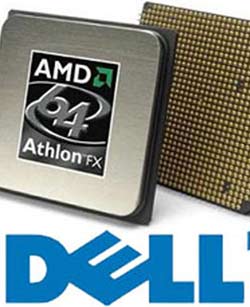Dell has announced that it will begin using chips produced by AMD – a surprising event in the PC industry, as the company has historically been loyal to Intel processors.
 |
| Source: Gizmodo |
Dell’s CEO stated that by the end of this year, Dell will utilize AMD’s Opteron chips in one of its high-end, multi-processor server models. “However, this is just a niche market,” Kevin B. Rollins added.
Kevin did not disclose whether Dell would use AMD chips in its desktop computers or other types of servers, but he affirmed that Intel remains the supplier of “the vast majority of processors for us.” During the press conference, he also briefly introduced several new personal computer products that Dell plans to announce this year, all of which will use Intel chips.
Dell made this announcement after its financial results for the first quarter of 2006 were released. The company’s profit for the period ending in May was $762 million, equivalent to 33 cents per share, down 18% compared to the same period last year. However, revenue increased by 6% to 14.2 billion USD, primarily due to growth in foreign markets.
Dell, the world’s largest PC manufacturer, explained that the decline in profit was due to the company lowering prices to gain market share while also investing in improving customer service.
Concerns Remain
The news of Dell’s use of AMD chips pushed AMD’s stock price up 13% after yesterday’s trading session. Meanwhile, Intel’s stock price dropped nearly 5%. Dell’s own stock price also rose 4%, reaching $23.95 per share.
Analysts are questioning why Dell waited until now to incorporate AMD chips into its products. Understanding this concern, Dell’s CEO stated that the company “had to listen to the market to see what customers wanted. AMD is very successful, so we are using their chips,” Rollins said.
He also outlined plans to improve Dell’s growth rate in the near future. Dell will continue to lower product costs and streamline operations. To achieve this, they will need to reduce warranty costs, change some materials and components without compromising quality.
However, Dell does not plan to cut its current workforce. Instead, they will hire an additional 2,000 sales and technical support staff and retrain over 5,000 employees. More than $100 million will be spent by Dell to enhance customer service quality – which Rollins noted is currently “deteriorating, harming the company’s image and revenue.”
Despite these plans, analysts remain concerned about the company’s future growth. “Clearly, Dell is undergoing many changes, but these changes come with a multitude of uncertainties,” said analyst Laura Conigliaro of Goldman Sachs.
Some others shrugged: “They haven’t provided any specific details about cost-cutting.” However, they acknowledged that what Rollins presented about Dell’s prospects could create a significant impact on the company.
Too Late?
Dell’s shift to using AMD chips in its server line may not solve many problems, but it is a sign that Dell is ready for change. However, adopting the Opteron chip at this point feels like it may be “too late.”
Dell’s main competitor, HP, has been offering products using AMD chips for over a decade. Currently, AMD chips are installed in more than 30 models of PCs and servers from HP. It is well known that AMD chips provide HP customers with a broader range of options in terms of price and performance.
In the laptop sector, which is currently the “hottest” market, Dell’s growth has not matched HP’s (12% compared to 27%). Dell’s global PC market share in the first three months of 2006 was only 18.1%, while HP is rapidly closing in with 16.4%. Only in terms of desktop PC revenue did Dell show superiority over HP (Dell increased 3%, HP increased 1%).
Dell claims that growth in foreign markets is a key factor at this time. Rollins mentioned that revenue in China has increased by 29%, while in South Korea it is 54% and in India it is 40%.
Shifting in the Chip Market
Dell’s eventual decision to sell servers using AMD chips indicates a clear shift in the chip market. Until now, Intel has always been the sole, exclusive supplier for Dell. This close relationship with AMD was only recently shaken by the emergence of the HP-AMD alliance.
“Even Dell has to admit that AMD provides excellent server chip products, if not better,” commented analyst Linley Gwennap.
For years, AMD was seen merely as Intel’s shadow. It wasn’t until three years ago that AMD began to change that perception with the introduction of the Opteron, the first server chip capable of running both 64-bit and standard 32-bit modes.
Initially, Intel officials actively criticized Opteron’s achievements and promoted a strategy of providing separate 32-bit and 64-bit chips. However, market developments forced Intel to change its strategy: launching dual-mode chips similar to Opteron.
Opteron’s initial clients were major corporations, from IBM and Sun Microsystems to HP. Last year, Opteron accounted for 20% of the server chips sold in the market.
Intel itself has to acknowledge that the Xeon chip – its direct competitor to Opteron – is still inferior to its rival. Intel is hoping that Woodcrest, a server chip expected to be released later this summer, will help close the performance gap between the two.
Thien Yi (Compiled from The New York Times, AP)

















































